You’ll find excellent virtual reality support groups through platforms like XRHealth and Foretell Reality, which offer customizable avatars and immersive 360-degree environments for mental health discussions. These VR communities provide enhanced anonymity that encourages honest sharing while licensed therapists guide sessions to guarantee your safety and support. Avatar-based interactions greatly reduce social anxiety and create comfortable spaces for those with mobility challenges or traditional therapy concerns. Discover how these innovative platforms can transform your therapeutic journey.
Understanding Virtual Reality Support Group Technology
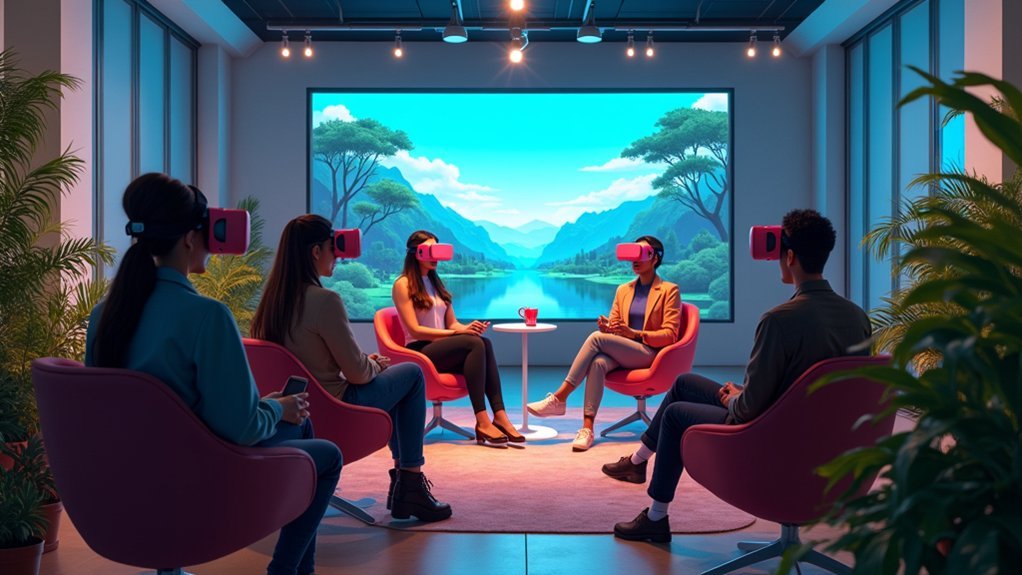
When you step into a virtual reality support group, you’re entering a computer-generated 360-degree environment that transforms how therapy sessions unfold. This immersive technology creates deeper emotional connections than traditional online support groups by placing you directly within shared virtual spaces.
You’ll customize your own avatar, giving you anonymity and comfort while discussing personal experiences. Motion tracking sensors respond to your movements, making the environment feel genuinely interactive and personalized.
Licensed therapists guide these VR therapy sessions, maintaining safety and supportive dialogue throughout your healing journey. This technology particularly benefits those with mobility challenges or social anxiety, offering accessible alternatives to in-person meetings.
The combination of immersion, customization, and professional guidance makes virtual reality support groups an innovative therapeutic approach.
Top VR Platforms for Mental Health Support Communities
Several leading VR platforms have emerged as frontrunners in delivering mental health support communities, each offering unique features tailored to therapeutic needs.
XRHealth stands out by enabling you to customize avatars for comfortable participation in virtual support groups, promoting anonymity while fostering meaningful connections.
Foretell Reality delivers real-time interactions in immersive 360-degree environments, allowing you to engage with licensed therapists and fellow participants seamlessly.
These platforms specifically address emotional support needs through guided discussions and safe spaces for vulnerable conversations.
The COVID-19 pandemic accelerated adoption, making these resources accessible to homebound individuals and those experiencing social anxiety.
Advanced VR technology continues expanding applications, promising improved patient engagement and reduced hospital readmissions.
Benefits of Avatar-Based Therapy Sessions
When you participate in avatar-based therapy sessions, you’ll discover a unique blend of privacy and authentic self-expression that traditional face-to-face support groups can’t match.
Your customizable digital identity creates a protective barrier that encourages honest sharing while immersing you in therapeutic environments designed to enhance emotional engagement.
You’ll find that these avatar interactions reduce social anxiety and provide safe spaces to practice coping strategies through role-playing scenarios.
Enhanced Anonymity and Privacy
Although traditional therapy sessions can feel intimidating due to face-to-face interactions, avatar-based virtual reality support groups offer you a powerful shield of anonymity that transforms how you’ll engage with mental health treatment.
Your customizable avatar becomes your protective barrier, allowing you to share deeply personal experiences without revealing your identity. This enhanced privacy eliminates judgment fears that often prevent meaningful participation in traditional settings.
| Traditional Therapy | VR Avatar Sessions |
|---|---|
| Face-to-face exposure | Complete visual anonymity |
| Social anxiety triggers | Reduced performance pressure |
| Identity-based judgments | Avatar-mediated interactions |
| Limited comfort zones | Enhanced emotional safety |
Virtual meetings through avatars encourage unprecedented openness. You’ll discover that anonymity doesn’t create distance—it builds authentic connections. The confidential platform guarantees your discussions remain secure while fostering intimate emotional exchanges that drive genuine healing and support.
Immersive Therapeutic Environments
Beyond the protective anonymity avatars provide, VR therapy sessions transport you into carefully crafted 360-degree environments that enhance your emotional engagement and therapeutic progress.
These immersive spaces create deeper connections during group discussions, making your sharing experiences feel more intimate and meaningful than traditional settings.
You’ll find yourself participating more actively in guided conversations and skill-building exercises within these virtual environments. The technology removes physical barriers while fostering genuine emotional bonds with fellow participants.
Research shows that VR therapy notably reduces anxiety levels, encouraging higher participation rates among group members.
These therapeutic environments transform how you engage with others, creating safe spaces where stigma dissolves. The enhanced comfort leads to improved satisfaction and better overall outcomes in your healing journey.
Customizable Identity Expression
While traditional therapy often leaves you feeling exposed and vulnerable, avatar-based sessions let you craft a virtual identity that reflects how you want to be seen. This customizable identity expression removes the fear of judgment that typically prevents honest sharing about sensitive topics.
You’ll find yourself opening up more freely when your avatar represents your ideal self, empowering deeper exploration of personal challenges.
Virtual groups become more engaging when you’re embodying a carefully crafted persona that feels authentic yet protective. The anonymity your avatar provides creates psychological safety, encouraging participation you might otherwise avoid.
This immersive environment builds stronger emotional connections with fellow participants, fostering genuine community bonds. You’re also able to practice social skills and coping strategies safely, building confidence that transfers to real-world interactions.
Specialized VR Groups for PTSD and Trauma Recovery
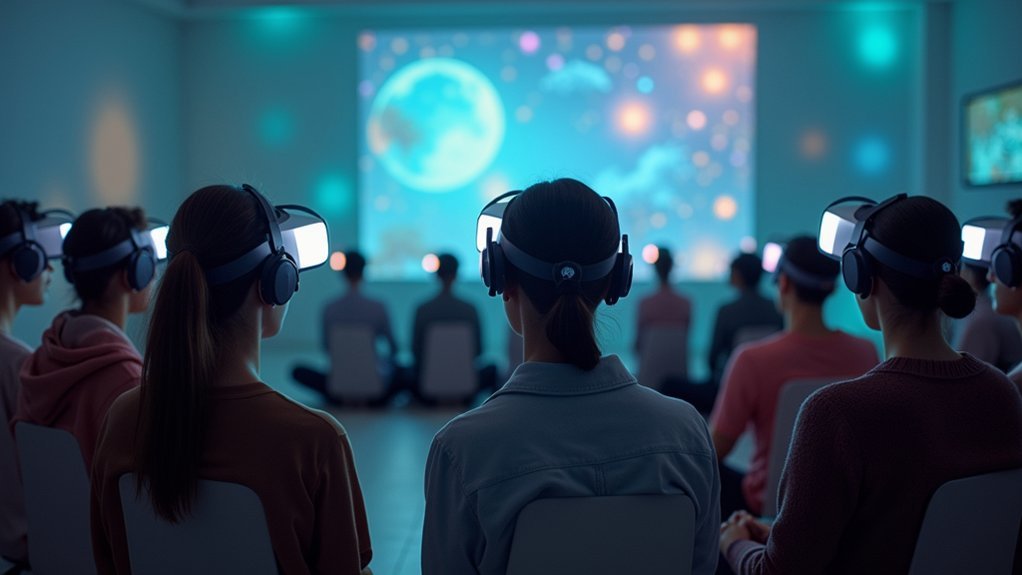
Many specialized VR support groups focus specifically on helping individuals recover from PTSD and trauma through immersive therapeutic environments.
These innovative health platforms combine cutting-edge technology with evidence-based therapeutic approaches to provide extensive support for trauma survivors.
VR exposure therapy gradually introduces trauma-related stimuli in controlled settings, allowing you to develop effective coping strategies while feeling safe.
Research demonstrates remarkable results, with participants experiencing up to 60% reductions in anxiety and distress levels.
Key benefits of VR trauma recovery groups include:
- Licensed therapists guide discussions and facilitate interactive exercises
- Avatar-based anonymity encourages honest, open sharing among participants
- Controlled immersive environments allow safe confrontation of traumatic experiences
- Community connections foster essential support networks for healing
You’ll find these specialized groups offer powerful tools for processing difficult experiences.
Accessibility Features in Virtual Reality Support Environments
Although virtual reality technology might seem intimidating, today’s VR support environments incorporate extensive accessibility features that guarantee everyone can participate meaningfully in therapeutic communities.
You’ll find user-friendly interfaces with voice commands and customizable avatars that accommodate varying technical skills and mobility challenges. Motion tracking sensors let you navigate virtual spaces naturally, regardless of your mobility level, creating truly immersive experiences.
VR platforms like XRHealth enable you to create personalized avatars, promoting anonymity and comfort if you feel self-conscious in traditional settings.
Personalized avatars in VR therapy offer safe anonymity for those uncomfortable with traditional face-to-face therapeutic settings.
These environments reduce sensory overload through calming atmospheres, benefiting those with anxiety or sensory processing difficulties. Developers increasingly integrate haptic feedback and sensory tools, ensuring you can fully engage with therapeutic virtual environments regardless of disabilities.
How to Join and Navigate VR Support Communities
You’ll need to start by researching platforms like XRHealth that specialize in VR therapy and support communities.
Once you’ve identified a suitable platform, you can register by creating an account and setting up your customizable avatar for anonymity.
Make sure you have a reliable internet connection and compatible VR device before beginning the registration process.
Finding VR Platforms
When searching for the right VR support community, you’ll want to start by exploring established platforms like XRHealth, which connects you with licensed therapists who lead guided sessions in immersive virtual environments.
These VR support groups offer unique advantages for mental health support through innovative technology.
Key features to look for when selecting platforms include:
- Avatar customization – Create personalized digital representations for anonymity and comfort during sessions
- Scheduled group sessions – Participate in structured 60-90 minute meetings for consistent community connection
- User-friendly navigation – Access head-mounted displays and motion tracking for seamless virtual interaction
- Accessibility support – Benefit from training workshops and intuitive interfaces designed for newcomers
These platforms prioritize creating safe spaces where you can share experiences while maintaining privacy through virtual anonymity.
Setup and Registration
After identifying the right platform for your needs, getting started with VR support communities requires completing a straightforward registration process.
You’ll register online with platforms like XRHealth, which provides immersive therapeutic environments designed for group interactions.
Before diving in, verify your setup includes compatible equipment. You’ll need a VR headset and reliable internet connection for best participation.
Once registered, you’ll create and customize your avatar, maintaining anonymity while enhancing comfort during sessions.
Most VR support groups feature licensed therapists who facilitate discussions, guaranteeing safe environments for all participants.
You’ll navigate virtual spaces using motion tracking sensors and interactive elements, creating engaging therapy experiences.
This technology transforms traditional support group models into immersive, accessible communities where meaningful connections flourish.
Professional Moderation in Virtual Reality Group Therapy
Professional oversight transforms virtual reality group therapy from a simple digital gathering into a structured therapeutic environment. Licensed therapists guide your sessions with specialized training in virtual dynamics, guaranteeing you’ll feel safe sharing personal experiences.
Professional moderation creates boundaries that protect all participants while encouraging authentic connections.
Your moderator handles multiple responsibilities during group therapy sessions:
- Facilitating productive conversations – They guide discussions and guarantee everyone’s voice is heard.
- Managing sensitive topics – They provide coping strategies when difficult subjects arise.
- Resolving technical issues – They address VR glitches that could disrupt your therapeutic experience.
- Maintaining therapeutic standards – They receive ongoing supervision to deliver quality care.
This professional guidance helps you open up without fear of judgment, creating the trust necessary for meaningful healing in your virtual support community.
Privacy and Safety Considerations for VR Support Groups
Beyond skilled moderation, your personal safety and privacy form the foundation of any effective VR support group experience. Avatars protect your identity while you share personal experiences in a safe environment. Licensed therapists oversee these virtual spaces, maintaining respectful atmospheres for all participants.
| Privacy Feature | Description | Benefit |
|---|---|---|
| Avatar Protection | Anonymous virtual representation | Identity concealment |
| Data Encryption | Secured personal information storage | Enhanced confidentiality |
| Informed Consent | Clear agreement protocols | Transparent participation |
| Moderated Sessions | Professional oversight | Safe discussions |
| Platform Policies | Detailed privacy guidelines | User protection |
You’ll need to provide informed consent before joining, ensuring you understand data usage and interaction expectations. VR platforms implement strict security measures to protect your information during discussions. You should review each platform’s privacy policies carefully, as these outline how your personal data will be handled and potentially shared with others.
Future Developments in Virtual Reality Mental Health Platforms
As VR technology rapidly advances, you’ll witness groundbreaking improvements in mental health platforms that’ll transform how therapy is delivered and experienced.
These innovations promise improved quality therapeutic experiences through cutting-edge features that’ll revolutionize your treatment journey.
- Enhanced Realism: Advanced graphics and motion tracking will create incredibly lifelike therapeutic environments that respond naturally to your movements.
- Haptic Feedback Integration: You’ll feel tactile sensations during sessions, creating deeper emotional connections and more engaging therapeutic experiences.
- AI-Powered Personalization: Artificial intelligence will adapt your VR environment in real-time, customizing therapy based on your unique responses and needs.
- Expanded Applications: Virtual group therapy sessions will connect you with others facing similar challenges, while family members can participate in your treatment process remotely.
These developments will considerably reduce hospital readmissions while improving overall mental health outcomes.
Frequently Asked Questions
How Do You Meet People in VR?
You’ll join VR social platforms like VRChat or Horizon Worlds, create your avatar, then explore public spaces, join interest-based rooms, attend events, or participate in activities where you can naturally start conversations with others.
Who Should Not Use Virtual Reality?
You shouldn’t use VR if you have severe motion sickness, epilepsy, significant visual impairments, or high technology anxiety. You’ll also struggle without proper equipment or reliable internet access.
Does Insurance Cover VR Therapy?
You’ll find insurance coverage for VR therapy varies considerably between providers. Some plans cover it under mental health benefits, while others don’t recognize it yet. Check your specific plan and get therapist documentation.
What Is the VR Game Where You Can Talk to People?
You can talk to people in VRChat, which lets you create custom avatars and socialize in user-generated worlds. AltspaceVR, Rec Room, and Bigscreen also offer social VR experiences with voice chat.
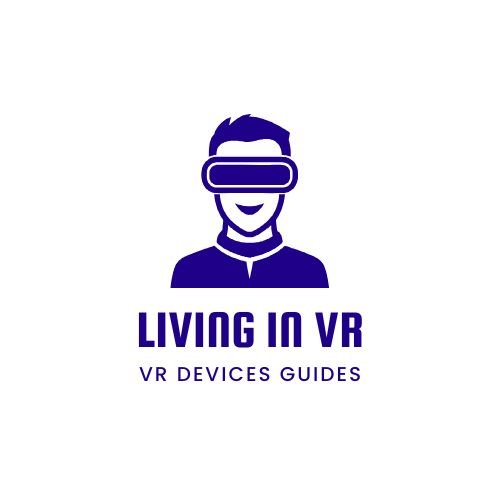
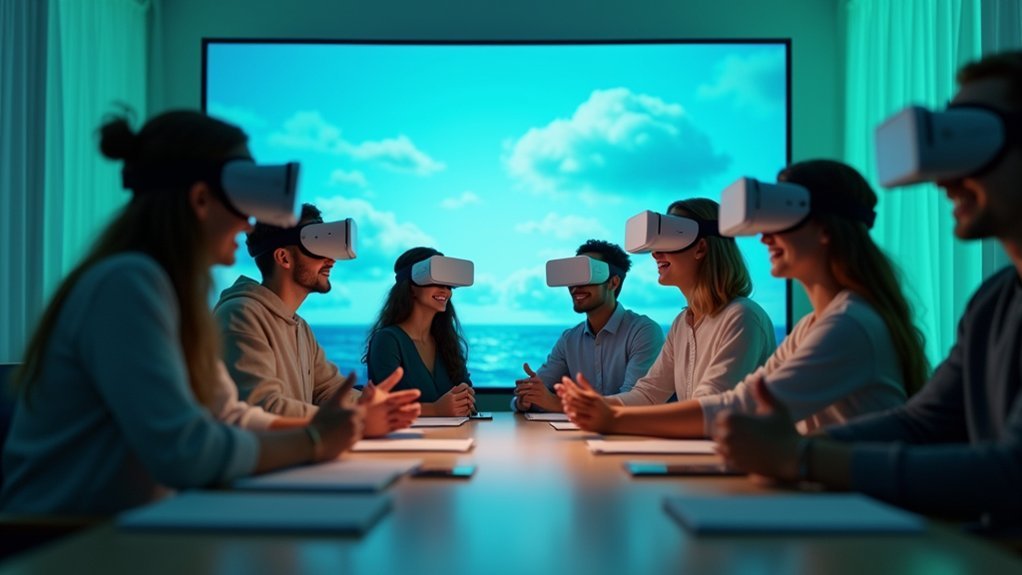
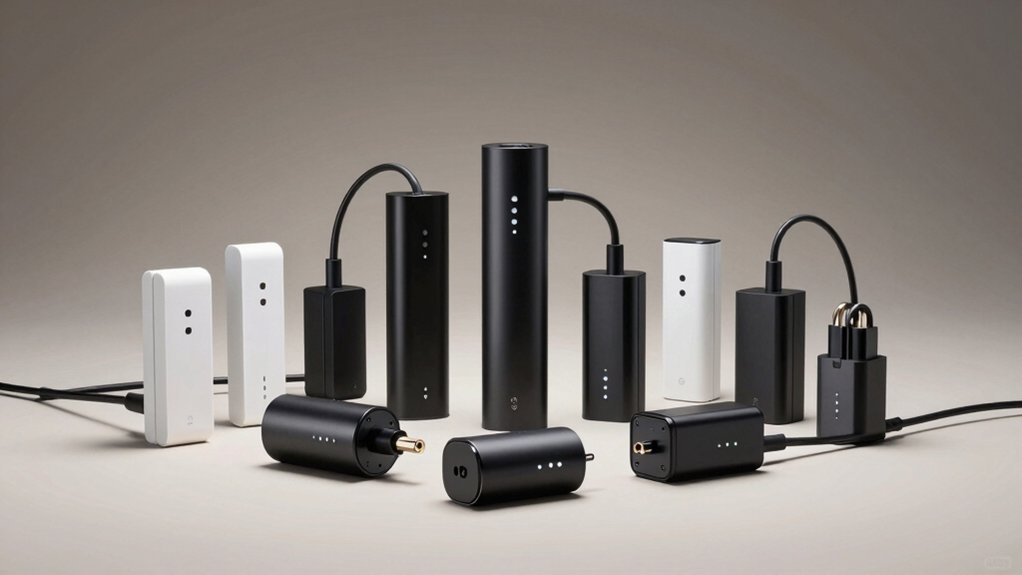
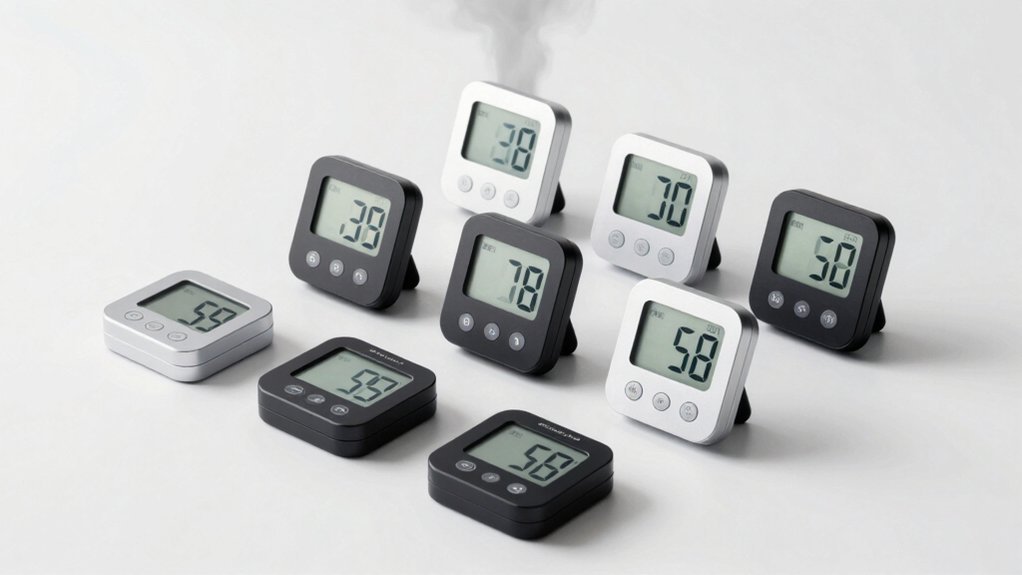

Leave a Reply